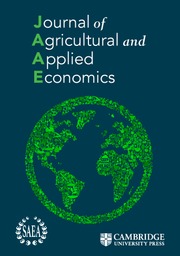Article contents
Agro-Ethics: Extension, Research, and Teaching
Published online by Cambridge University Press: 28 April 2015
Extract
Student unrest and the dissatisfaction of activists with the performance of “the establishment” shook our society to its roots in the late 1960s and early 1970s, as underlying values and accepted concepts of right and wrong were criticized. Agriculture did not escape and is still widely criticized. Agro-ethics was born. Phrases sufficient to indicate the extent of the current concern about agro-ethics include: animal rights, environmental ethics, recombinant DNA, hard tomatoes/hard times, the export of our soil, energy ethics, Nestle and the multi-nationals, feeding the world's hungry, the plight of the small farm, helping the poorest of the poor, farmer-adapted technology, small is beautiful, and who controls U.S. agriculture.
- Type
- Research Article
- Information
- Copyright
- Copyright © Southern Agricultural Economics Association 1982
References
- 21
- Cited by


